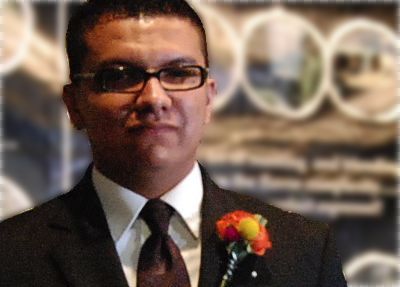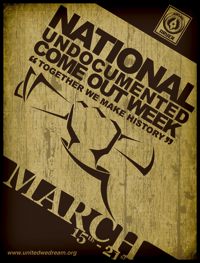
Oscar Rayo
Renata Soto: "Our nation cannot afford to waste Oscar’s potential"
Overton High School senior Oscar Rayo won the My Latino Roots, My American Dream contest sponsored by Conexion Americas last fall. In his essay, he describes his journey to the U.S., the challenges he faces here, and his dream of a voice for unvisaed immigrants.The essay is reproduced below, in full, inside Renata Soto's speech about MLK and Latinos in America, which she delivered January 14 at Maryville College.
What makes this week the perfect one for reading Renata's speech and Oscar's winning essay?
Yesterday was National Coming Out Day, which launched a week-long “coming out” of undocumented youth across the country.

A week from Sunday is March for America, in which thousands will go to Washington, D.C. to demand good jobs and full citizenship for all of America’s families.

This week was International Women's Day, and it was Conexion America's Renata Soto who eloquently matched up Rayo's award-winning story to the narrative of Martin Luther King, Jr. in the address she gave to Maryville College on January 14, 2010.

January 14 speech by Renata Soto at Maryville College, with full text of Oscar Rayo essay
As we celebrate the legacy of Dr. Martin Luther King, Jr., I celebrate my African ancestors and their rich legacy so evident in our Latin American culture, music, art and way of life.
I also celebrate the presence and contributions of black Latinos to the local community and reflect on the struggles of African Americans here in my adopted home. While our histories are different --we came here by choice not by force--what it is common and shared in both stories is the desire for human dignity, the desire to fulfill the ideals of justice for all. We are reminded that we must deepen and strengthen the ties that bind our communities to make sure all children have access to a quality education, all neighborhoods are thriving and healthy, and all families are economically stable.
The Latino experience in the south is only understood if we are willing to understand the journey the most take to come here. It is a story of immigration. If we were in Texas or California, where the Latino community has a long historical presence, the topic of immigration would still be an important dimension but not the only one.
We cannot talk about Latinos in Tennessee without talking about immigration policy. We cannot have an honest conversation about Latinos and civil rights without talking about immigration policy.
Fifteen years ago when I started my nonprofit career working with Latinos in Atlanta, GA, I accepted as mine the challenge that Dr. King posted to all of us from a Birmingham jail when he wrote:
We are caught in an inescapable network of mutuality, tied in a single garment of destiny. Whatever affects one directly, affects all indirectly.And that is why in the message that I bring to you today, I bring you the voice of Oscar. Oscar wrote the winning essay of Conexión Américas’ Essay Contest for Young Writers, an activity we host during our celebrations of Hispanic Heritage Month. The theme that high school students were asked to address was “Mis raices hispanas, mi sueño americano” (“My Hispanic Roots, My American Dream”). This is what Oscar wrote:
Essay by Oscar Rayo
My name is Oscar. I am 17 years old and I am in the 12th grade at John Overton High School in Nashville, TN. Five years ago, I left a poor town in Guerrero, Mexico, along with my father and brother to come to Nashville.
When I came to the United Sates, I brought with me a bag full of memories and dreams. The idea of having a better life and a better education filled my heart with joy and aspirations. Now that I am in the land of opportunity, those dreams and aspirations have become something different: goals.
The journey to the United States was very difficult. I had seen in the news that people died in the dessert, dehydrated or lost. I also had heard of people who had drowned in the river, who had lost their arms or legs, or that simply no one ever knew what had happened to them. All of that was very frightening, but the desire to see my family gave me strength to take the risk.
My father had decided that we would come in December to enjoy Christmas with my mother and sisters, who were already here.
The journey started in Ciudad Juarez. We along a group of people crossed the Rio Bravo in a boat in the morning. By night we were walking through the dessert, which was cold, even colder for our wet bodies.
We walked for seven hours through the dessert. We stopped every hour to drink some water and to rest a little. The one thing my father, brother and I did was to hold hands so we would not get lost or lose each other. Finally, we got to a highway, where a truck was waiting for us. We arrived to Houston, Texas, where some relatives picked us up and then brought us to Tennessee.
My experience here in the United States, like for millions of immigrants, has not been easy. The time I have lived here has taught me the meaning of perseverance. When I see my parents and sisters come back from work exhausted, it makes me think about all their efforts so that my brother and I can go to school.
My dream is to be able to go to college. I consider myself a good student, smart, diligent, dedicated and hard-working. I would like to go to college so that one day I can earn enough money to bring here my oldest brother, who is disabled. The left side of his body is partially paralyzed.
I also would like to go to college so that I can become someone my parents would be proud of.
My dream is to study accounting, although I am interested in many other things, such as history, mathematics and engineering. If I study accounting, I could manage my family’s finances. That is important because in difficult times like these, there are many families who are losing their homes. I would like to help those families.
One of my greatest dreams is that one day my voice, and the voices of my parents, of my siblings and of other 20 million immigrants, would be heard.
It is very sad to see that the nation for which we break our backs working, whose customs we have adopted, and whose tragedies we suffer as ours, does not accept us. We are not here to bother anyone. All we are looking for is the opportunity for a better life for us here and for our relatives back home.
Life as an immigrant is hard. We experience abuses, discrimination and many other injustices. The worst of all is that people do not report those abuses; they prefer to remain silent out fear of retaliation. Being an immigrant is like being invisible, voiceless, powerless. We live in constant fear of the possibilities of being detained and sent back home.
Every day when I come home from school, there is uncertainty for me. When I open the door, I don’t know whether I will find my parents and siblings. Every time when I see my parents coming back from work I turn to heaven and say “Gracias, Dios mio” (thank you, my God).
I don’t know what will happen if one day I make it home but the rest of family doesn’t.
My dream is that one day that separation of families will no longer be a threat and that something will be done so that I don’t have to live in constant fear.
I hope that someday something will be done so that immigrants don’t have to risk their lives or be separated from their families.
I also hope that I, and millions of Latino students, will have the opportunity to go to college so that we can become good, productive citizens.
Finalmente, espero que la voz de los inmigrantes sea escuchada y dejemos de vivir en las sombras.
And finally, I hope that one day the voice of immigrants will be heard and we will no longer have to live in the shadows.(Soto speech, cont.)
Oscar is a very courageous young man. His essay, so open and honest, is a window to the obstacles and opportunities Latinos face.
In the occasion of this week’s celebrations of the life and legacy of Dr. King, I would like to reflect on Oscar’s 2009 essay through the lens of a few passages from Dr. King’s LETTER FROM BIRMINGHAM JAIL, written in 1963.
Dr. King told us that
Anyone who lives inside the United States can never be considered an outsider anywhere within its bounds.Yet today, Oscar lives in fear and feels he is voiceless, powerless. Not even an outsider, Oscar sees himself as “invisible.”
Oscar writes that the journey to come to this country was very frightening, but that the desire to see his mother and sisters gave him strength to take the risk, just like the desire of his parents to provide him with a better future left them with no choice but take the family up north. Even if there was not a legal path to get there.
Dr. King argued that “there are two types of laws: just and unjust.” He writes
I would be the first to advocate obeying just laws. One has not only a legal but a moral responsibility to obey just laws. Conversely, one has a moral responsibility to disobey unjust laws.He continues:
Any law that uplifts human personality is just. Any law that degrades human personality is unjust.While Oscar’s parents were disobeying the US immigration laws when they decided to come here, they were also pursuing their moral responsibility and their basic human right to work with dignity, to be fairly compensated for that work, and to provide food and shelter and meet the basic needs of their children.
While there are factors that push Oscar’s family away from Mexico, there are also undeniable realities that pull them to come the US. The problem is those social and economic realities –here and there-- are not reflected in an outdated immigration system that welcomes them but almost as second-class citizens, an outdated immigration system that degrades their humanity: in the way it forces them to come here, in the way that exposes them to exploitation once working here, and in the way that isolates them from community life. This isolation is painfully real as Oscar reflects in his closing paragraph:
I hope that one day the voice of immigrants will be heard and we will no longer have to live in the shadows.Now, I know this is a nation of laws, and the rule of law is one of the greatest foundations upon which this country is built. So what part of “illegal” don’t I understand? some of you may be asking.
I will add that, this is not simply a nation of laws…this is a nation of just laws. It is in that aspiration of “justice for all” that lays that strength of this great nation.
Dr. King wrote
In no sense do I advocate evading or defying the law […] That would lead to anarchy. One who breaks an unjust law must do so openly, lovingly, and with a willingness to accept the penalty.I cannot think of a more open defiance of the injustices of poverty and of the forces of nature than the journey one takes to cross the Rio Bravo. I know there is only love in the heart of Oscar’s parents when they decide to go north to pursue a better quality of life. And I know there is unquestionable willingness to accept the highest penalty when Oscar, his siblings and parents risk their lives and leave everything they know behind for the opportunity of a fresh start.
But still, you are asking, should we grant Oscar and his family the civil rights the rest of us rightfully enjoy?
The sanctity of civil rights in this country lies in the rights themselves, not the individuals they protect. When we relax those rights for anyone, we all suffer a profound loss. This concept was explained recently by the federal judge who struck down the anti-immigrant ordinances passed in Hazelton, PA. In his 206 page opinion, Judge Munley concluded,
The genius of our Constitution is that it provides rights even to those who evoke the least sympathy from the general public. In that way, all in this nation can be confident of equal justice under its laws...We cannot say clearly enough that persons who enter this country without legal authorization are not stripped immediately of all their rights because of this single act … The United States Supreme Court has consistently interpreted [the 14th Amendment] to apply to all people present in the United States, whether they were born here, immigrated here through legal means, or violated federal law to enter the country.So I hear you saying, but why didn’t Oscar’s parents just wait in line for their turn to apply for a visa to come here? The simple reality is that there is no line for people like Oscar and his family. There is no line.
And to those of you who will insist Oscar’s parents should have waited until a legal path was open, I will share with you Dr. King’s words of impatience with…
...who is more devoted to "order" than to justice; who prefers a negative peace which is the absence of tension to a positive peace which is the presence of justice; who constantly says: "I agree with you in the goal you seek, but I cannot agree with your methods of direct action"; who paternalistically believes he can set the timetable for another man's freedom; who lives by a mythical concept of time and who constantly advises the Negro to wait for a "more convenient season." Shallow understanding from people of good will is more frustrating than absolute misunderstanding from people of ill will. Lukewarm acceptance is much more bewildering than outright rejection.Oscar and his parents could not have followed our timetable. They couldn’t sit and wait in despair and hopelessness for signs of courage from our leaders in congress to change our immigration system when –if ever- it appears politically convenient.
No one disputes that countries have a right to control their borders and who comes in. But sovereign responsibility needs to be balanced with a basic human right for people to have a home country, and a reasonable freedom to move to another country where one can better fulfill their god-given potential. Unfortunately, our current immigration system does not provide legal avenues for many of the immigrants like Oscar’s parents who come to make a better life here, and who work hard to contribute to our collective future, even if we don’t recognize it.
Unfortunately, when we refuse to change outdated laws and criminalize workers for their work, we don’t make immigrant workers less necessary to our economic vitality. We don’t change the underlying reasons why immigrants seek a life here. We simply make them more vulnerable to exploitation. And we make them retreat to further isolation out of fears of deportation if they try to protect themselves legally.
Remember the words from Oscar: We experience abuses, discrimination and many other injustices. The worst of all is that people do not report those abuses; they prefer to remain silent out fear of retaliation.
As we celebrate the legacy of Dr. King, and remind ourselves of the basic rights and freedoms we all share, it is imperative that we reexamine our national immigration system and ensure that people have a reasonable opportunity to come to this country through a safe, legal, and orderly process, to work and improve their lives with dignity and respect, and to live under the full protection of our laws.
As we answer Dr. King’s call for action, I leave you with words of Oscar, a simple but profound message:
One of my greatest dreams is that one day my voice, and the voices of my parents, of my siblings and of other 20 million immigrants, would be heard.Please, listen to Oscar.
Our nation cannot afford to waste Oscar’s potential.
Our nation cannot be deprived of what he has to offer and of what he can become.
He represents the immigrant story that has built this country in the past, and he is also our future.

Great essay, and nicely folded in with the writings of MLK.
ReplyDelete